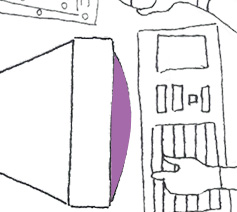|
||||||||||

|
||||||||||
Cyber Bullies and Predators |
||||||||||

|
Bullies don't only live in the school playground. You can find them in life at large – in colleges, office spaces, and social groups. But what if a bully could mask themselves, and maneuver without being seen? These types of bullies do exist and their home is on the Internet. | 
|
||||||||
Do You Act like a Bully?Some cyber bullies don't think of their actions as bullying, because in person, they are actually shy people. Often, the quietest people have the most aggressive personalities online. Some may even have a history of being bullied themselves, and use the Internet to bully as a form of retaliation. Review this checklist to see if you have ever bullied someone: If you have behaved in any of these ways, it's time to change your 'netiquette' (Internet etiquette). You may not be a full-fledged cyber bully but you have definitely been hostile online, and you may have been guilty of harassment. Do not use the Internet as a vehicle for your frustration or resentment. Seek real solutions to your feelings and avoid lashing out at others – even if they are the cause of your frustration. And remember, don't send emails when you're angry. Wait until you cool off to contact somebody and you'll both be better off. How a Cyber Predator Operates
|
Cyber Bullies |
|
Bullies don't only live in the school playground. You can find them in life at large – in colleges, office spaces, and social groups. But what if a bully could mask themselves, and maneuver without being seen? These types of bullies do exist and their home is on the Internet.
Cyber bullies bully others through email, instant messages, and websites and have an extra weapon over face-to-face bullies – they can remain anonymous. In fact, some people are more inclined to bully others online, because they believe there are less chances of getting caught. Despite this difference, their tactics remain the same: to make others feel bad about themselves so they can feel. |
|
Cyber Predators |
|
Other cyber predators are more subtle. They are not looking for sexual gratification, but are looking to take advantage of you in some other way for their own personal gains – sometimes emotional, financial, or even for the purpose of immigration. Your best defense against becoming 'prey' is to recognize the signs of a predator and to use your street smarts to avoid them. |
|
Fighting Back |
|
|
Don't Keep It to Yourself
If you receive one or several messages that make you feel uncomfortable or harassed, chances are you're being bullied. Make sure to tell someone you trust, like a parent, family member, teacher, coworker, or counselor. Telling a friend can help, but don't hesitate to tell someone else who may have more experience dealing with harassment. There are also organizations where you can receive advice anonymously. If the message or messages you have received are threatening or harassing then you should tell your local police. Treat Your Email Address like a Phone Number Give your email address to people you already know and trust and be cautious when posting your email on websites, chatrooms or instant messenger services. Also, don't give out your friends' addresses without their permission. Having control over your web conversations is the best security measure. You decide who you want to chat with so don't let people guilt you into chatting with them, by calling you unfriendly or other names. Although you can change your email address if you are being bombarded with emails you don't want, you may already have been exposed to hurtful or disturbing emails. Learn how to block senders Check out the options or preferences in your email or instant messenger service for the ways you can block users from contacting you. Sometimes you need to add the sender to your blocked users list or sometimes you can just right-click on the name and select 'block'. Be Cautious When Meeting an Online Friend There are no absolute rules in cyberspace. Some sites will tell you never to meet somebody you met online in person, but this level of precaution is unrealistic and restricting. The World Wide Web hosts communities where many good people play and work. If you make friends in online communities, you do not have to assume they want something from you other than your friendship. Of course you must be cautious; when meeting with a new online friend, bring a trusted person along or meet in a public place where you have control over the situation at all times. |
